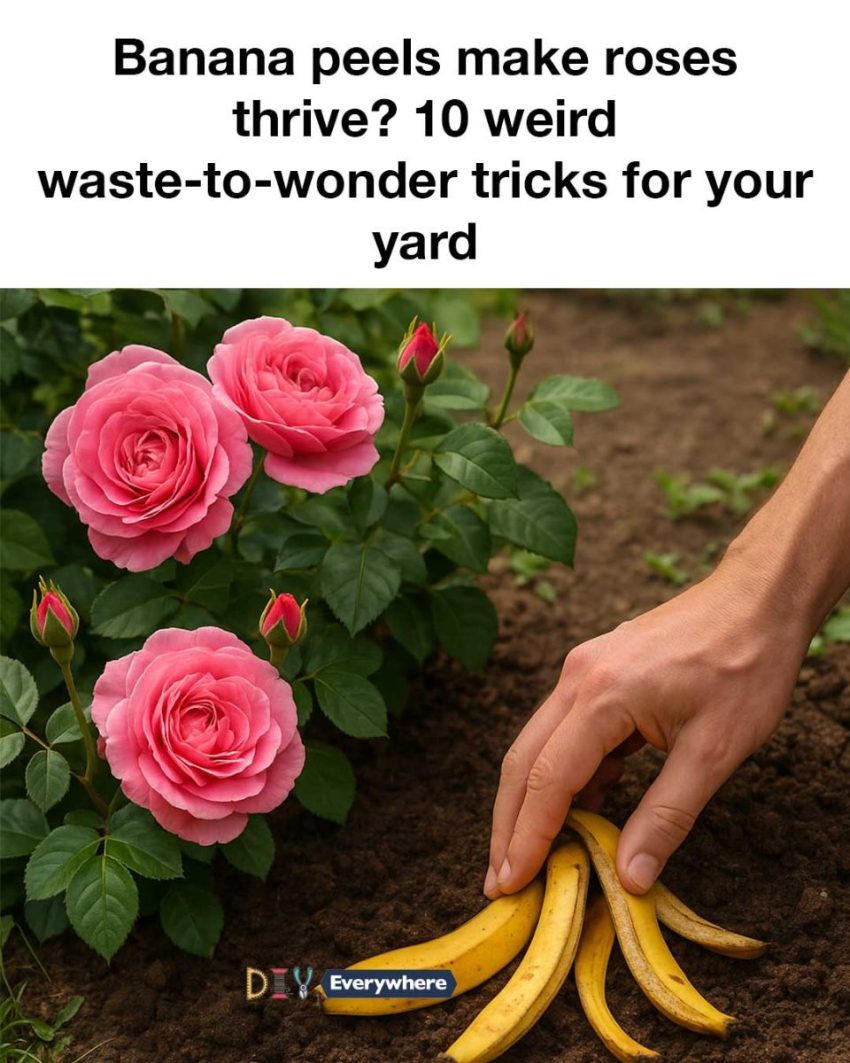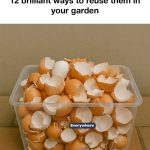ADVERTISEMENT
1. Banana Peels: A Rose’s Best Friend
Banana peels are rich in potassium, a vital nutrient that helps roses grow strong and vibrant. To use banana peels in your garden, simply chop them into small pieces and bury them around the base of your rose bushes. As they decompose, they release potassium and other nutrients into the soil, promoting healthier blooms.
For an added boost, you can also create a banana peel tea by soaking the peels in water for a few days. Use this nutrient-rich liquid to water your roses, providing them with an extra dose of potassium.
2. Coffee Grounds for Acid-Loving Plants
Coffee grounds are an excellent addition to the soil for acid-loving plants like azaleas, rhododendrons, and blueberries. The grounds help lower the pH level of the soil, creating an ideal environment for these plants to thrive. Sprinkle a thin layer of used coffee grounds around the base of your acid-loving plants, being careful not to overdo it, as too much can lead to nitrogen burn.
Additionally, coffee grounds can improve soil structure and attract beneficial earthworms, which help aerate the soil and improve nutrient uptake.
3. Eggshells as Natural Pest Deterrents
Eggshells are a great natural deterrent for pests like slugs and snails. Crush the shells into small pieces and scatter them around the base of your plants. The sharp edges of the shells deter soft-bodied pests from crossing them, protecting your plants from damage.
In addition to pest control, eggshells are a good source of calcium, which is essential for plant growth. Rinse and dry the shells before crushing them to avoid attracting unwanted pests.
4. Tea Leaves to Boost Soil Nutrients
Used tea leaves can be a valuable addition to your garden soil. They contain tannic acid and nutrients that can help improve soil structure and fertility. After brewing your tea, remove the leaves and sprinkle them around your plants or add them to your compost pile.
Tea leaves can also help with moisture retention in the soil, reducing the need for frequent watering. Just be sure to use organic tea leaves to avoid introducing any unwanted chemicals into your garden.
5. Citrus Peels to Repel Cats
Citrus peels can be an effective way to keep cats out of your garden. Cats dislike the strong scent of citrus, so scattering orange, lemon, or lime peels around your garden can deter them from using it as a litter box.
In addition to repelling cats, citrus peels can also add nutrients to the soil as they decompose. Just be sure to replace the peels regularly, as their scent diminishes over time.
6. Grass Clippings as Mulch
Grass clippings are a readily available and effective mulch for your garden. Spread a layer of clippings around your plants to help retain soil moisture, suppress weeds, and add organic matter to the soil as they break down.
Be careful not to apply too thick a layer, as this can lead to matting and poor air circulation. A layer of about 1 to 2 inches is usually sufficient. Avoid using clippings from lawns treated with herbicides, as these chemicals can harm your plants.
7. Vinegar for Weed Control
Vinegar is a natural and effective weed killer. Its high acidity makes it a powerful herbicide that can kill weeds without harming the environment. To use vinegar for weed control, fill a spray bottle with white vinegar and apply it directly to the leaves of unwanted plants.
For best results, use vinegar on a sunny day, as the heat will enhance its effectiveness. Be cautious when applying vinegar near your desired plants, as it can harm them as well.
8. Newspaper Layers for Weed Suppression
Newspaper is an excellent tool for suppressing weeds in your garden. Lay down several layers of newspaper around your plants, then cover them with a layer of mulch. This creates a barrier that blocks sunlight, preventing weed seeds from germinating.
As the newspaper decomposes, it adds organic matter to the soil, improving its structure and fertility. Be sure to use black-and-white newspaper, as colored inks can contain harmful chemicals.
9. Epsom Salt for Greener Lawns
Epsom salt, which contains magnesium and sulfate, can help promote greener, healthier lawns. Dissolve 2 tablespoons of Epsom salt in a gallon of water and use a sprayer to apply it evenly across your lawn.
This treatment can help improve nutrient uptake and enhance the overall health of your grass. Apply Epsom salt to your lawn once a month during the growing season for best results.
10. Baking Soda for Sweeter Tomatoes
Baking soda can help reduce soil acidity, leading to sweeter tomatoes. Sprinkle a small amount of baking soda around the base of your tomato plants, being careful not to overapply, as too much can harm the plants.
The baking soda will gradually work its way into the soil, raising the pH level and resulting in sweeter fruit. This method is best used in moderation and as part of a broader soil management strategy.
11. Wood Ash to Raise Soil pH
Wood ash is a natural way to raise the pH level of acidic soils. It contains potassium, calcium, and other trace minerals that can benefit plant growth. To use wood ash in your garden, sprinkle it lightly over the soil and mix it in well.
Be cautious when using wood ash, as too much can raise the soil pH too quickly and harm your plants. It’s best to test your soil’s pH before application and use wood ash sparingly, especially around acid-loving plants.


